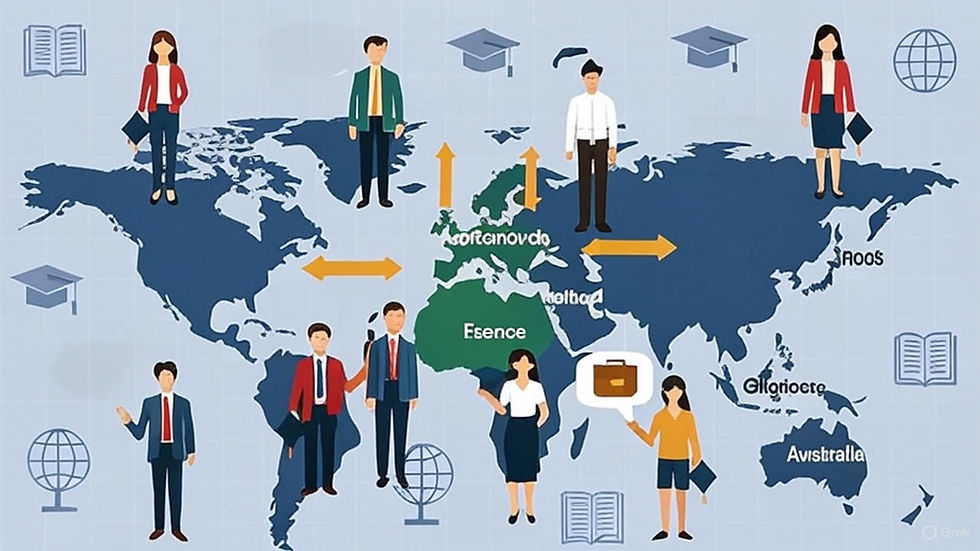Decision Making in Life and Its Implications (ICC Blog #41)
- Dr Sp Mishra
- Sep 18, 2024
- 4 min read
Updated: Oct 1, 2024

Decision-making plays a crucial role in our everyday routines. Whether it's selecting a breakfast meal or determining a career direction, we engage in constant decision-making. While some choices are trivial and can be reversed effortlessly, others hold substantial importance and are challenging to amend once finalized. Decisions with a profound impact on our lives, like those concerning careers, marriages, and business collaborations, demand thoughtful evaluation because of their enduring repercussions.
During an insightful interview, Jeff Bezos, the renowned entrepreneur and Amazon founder, shared a profound perspective on decision-making. He eloquently categorized life's choices into two distinct types: two-way door decisions and one-way door decisions. Two-way door decisions are those that allow for reversibility, where one can easily backtrack and choose a different path if the initial choice does not yield the desired outcome. On the other hand, one-way door decisions are more permanent, often leading to irreversible consequences once taken. Bezos' analogy provides a valuable framework for evaluating the impact and significance of the decisions we make in various aspects of our lives, urging us to consider the long-term implications and potential reversibility before embarking on a particular course of action.
Furthermore, Bezos' insightful classification underscores the importance of strategic thinking and foresight in navigating life's complexities. By distinguishing between two-way door and one-way door decisions, individuals are encouraged to approach choices with a heightened sense of awareness and deliberation, weighing the risks and benefits associated with each path. This distinction not only empowers individuals to make more informed decisions but also fosters a culture of adaptability and resilience, enabling them to pivot and adjust course when faced with unforeseen challenges or opportunities.
Reversible vs. Irreversible Decisions
Many of the decisions we make in our daily lives can be undone. For example, if you opt for a new route to work and find it to be less efficient, you can easily switch to a different route the following day. These choices are relatively low-risk and can be modified with little effort and impact. On the other hand, there are decisions that are more difficult to reverse. Selecting a career, getting married, or entering into a business partnership are instances where changing course, while feasible, requires a substantial investment of time, energy, and emotions.
The Weight of Life-Impacting Decisions
Decisions that have a significant impact on life frequently come with a considerable amount of unpredictability and potential danger. For instance, selecting a profession can have long-lasting effects on your financial security, work contentment, and general well-being in the future. Likewise, marriage is a promise that impacts your private life, emotional health, and even your standing in society. Collaborating in business, in particular, demands a strong foundation of trust and shared comprehension, as it can sway the outcome of your entrepreneurial pursuits.
The Importance of Slowing Down
Due to the possible consequences of these choices, it is essential to take a step back in the decision-making process. Hastily making a significant decision can result in remorse and unexpected issues. Spending time to carefully assess your alternatives, consult reliable sources, and contemplate future outcomes can reduce the associated risks. While this methodical strategy might induce stress and unease while making decisions, it ultimately results in better-informed and assured selections.
Jeff Bezos is known for his strategic approach to decision-making, which involves a deliberate process of slowing down to ensure thoughtful and well-informed choices. This method allows for a thorough evaluation of all factors involved in a decision, leading to more effective outcomes in the long run. By taking the time to consider different perspectives, gather relevant information, and weigh the potential risks and benefits, Bezos believes that this approach can help avoid hasty decisions that may have negative consequences. This emphasis on slowing down the decision-making process reflects Bezos's commitment to quality, innovation, and long-term success in business.
Here are some ideas;
Collect Information: Gather as much relevant information as you can, including exploring your options, understanding potential outcomes, and drawing lessons from others' experiences.
Ask for Guidance: Seek advice from trusted friends, family, or professionals who can offer valuable insights and perspectives.
Weigh the Pros and Cons: Create a list of the benefits and drawbacks of each option to help you visualize the potential consequences of your decision.
Think about Long-Term Impact: Consider how your decision will influence your future and whether it aligns with your long-term goals and values.
Listen to Your Intuition: While it's essential to be logical, don't disregard your instincts. Sometimes, your gut feelings can lead you in the right direction.
Conclusion
Ultimately, although many choices in life can be easily undone, some have important consequences that demand thoughtful deliberation. Taking the time to make decisions and using effective techniques can lead to better-informed and more assured choices. While this method may cause stress in the decision-making process, it ultimately enables us to tackle life's challenges with enhanced clarity and confidence.
Hope you liked this article. Do share your thoughts and share with others.




Comments